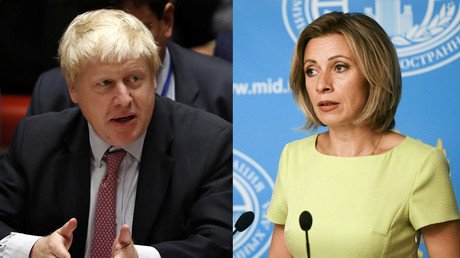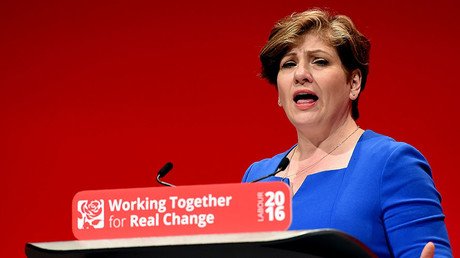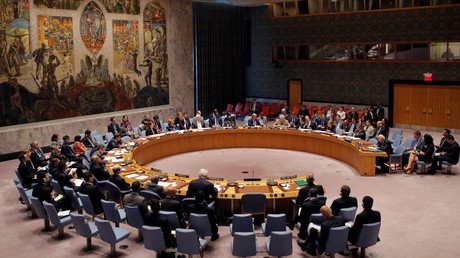Boris Johnson calls for Russian Embassy protests during Syria debate
UK Foreign Secretary Boris Johnson has used his debut at the House of Commons dispatch box to accuse Russia of bombing an aid convoy in Aleppo, and asked why anti-war activists have not mounted protests outside the Russian Embassy in London.
“Where is the Stop The War coalition at the moment? Where are they?” asked Johnson, during an emergency parliamentary debate on the situation in Aleppo, Syria.
“All the available evidence therefore points to Russian responsibility for the atrocity,” said Johnson, referring to the bombing of the UN aid convoy on September 20 that resulted in the deaths of 20 people, and the destruction of 18 trucks, which he had previously called a “war crime.”
“There is no commensurate horror, it seems to me, amongst some of those anti-war protest groups,” said Johnson.
“If Russia continues in its current path, then I believe that great nation is in danger of becoming a pariah nation,” said the Foreign Secretary, who was appointed by Theresa May in July.
Johnson also called for further sanctions against Russia, which is already under several Western embargoes over Crimea, and the conflict in eastern Ukraine.
“We’ve got to make sure we have innovative ways of getting aid into Aleppo, and as several members have said, we have to step up the pressure on Assad’s regime through sanctions and on the Russians through sanctions,” said the Conservative politician.
He also raised the possibility of an international legal effort to bring to justice those allegedly responsible for war crimes in Syria, a day after France and UN Secretary Ban Ki-Moon made the same appeal.
“I’m personally very attracted to the idea of getting these people [war criminals] to come before the International Criminal Court. That’s certainly something I would like to pursue,” said Johnson.
In part, France’s war crime allegations prompted Russian President Vladimir Putin to call off next week’s scheduled visit to the country.
Johnson, 52, said that the UK had few practical means of influencing the Syrian conflict directly, and rejected the proposal of a Western-imposed no-fly zone over Aleppo, “unless we are prepared to shoot down planes or helicopters that violate that zone.”
“Our best hope is to persuade the Russians that it is in the interests of Russia to do the right thing in Syria,” Johnson surmised.
Russia responded to Johnson’s proposals within minutes, by making a mocking reference to an earlier statement by the Foreign Secretary, who claimed that the “most potent weapon” against Russia is “shame.”
“It looks like Boris Johnson has moved from words to action, and has unleashed the very weapon with which he threatened Russia – shame,” said Russia’s Foreign Ministry spokesperson Maria Zakharova on her official Facebook feed. “As of now, we all feel ashamed on his behalf.”
The Russian Embassy in London also expressed its concern over Boris Johnson’s statements by calling the UK parliamentary debate on Syria “depressing.”
“The speeches of those who participated in the discussion contradict the logic of all previous decisions of the International Syria Support Group (ISSG) as well as UN Security Council resolutions,” the embassy’s press secretary said in a statement, stressing that the UK is a member of both the UNSC and the ISSG.
The embassy also expressed its regret over the fact that “the British parliamentarians placed themselves on the wrong side of history” as "Syria is going through the hard process of defeating terrorists.”
Very unusual call from the Foreign Secretary to hold demonstrations in front of the Russian embassy. New form of British diplomacy? pic.twitter.com/rzxUkGyyrQ
— Russian Embassy, UK (@RussianEmbassy) October 11, 2016
Relations between Moscow and the West have hit a new low since the September 20 incident, which followed months of futile attempts to negotiate the creation of a joint operational force that would allow the US and Russia to work together to clear Islamic State (IS, formerly ISIS/ISIL) and other extremist groups out of Syria.
Since then, the US has suspended bilateral ties with Russia regarding Syria, while Western politicians have accused Moscow of militarily backing the forces of Syrian President Bashar Assad, who appears to be on the ascendant in his battle to re-capture Aleppo, once the country’s biggest city, from the rebels.
Both Assad and Moscow have insisted that the Syrian forces are battling terrorists in the city, and say that Washington has failed to clearly identify the presence of “moderate” rebels in the battle for the key hub in the north of the country.















